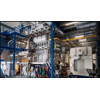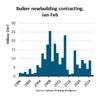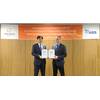Incat Designed Catamaran Ferry for Seaspovill
Incat Crowther announced contract to design a 50m Catamaran Passenger Ferry for South Korean operator Seaspovill. The vessel will join the operator’s existing fleet which runs from the mainland ports of Donghae and Gangneung to the island of Ulleung-do, a renowned destination for outdoor activities such as hiking.
Incat Crowther worked with Seaspovill to develop the design of the vessel, and then assisted in the preparation of a preliminary design package and the selection of Austal Philippines to construct the vessel. During this process, Incat Crowther representatives attended operations with Seaspovill and performed detailed route operability analysis.
The fully IMO HSC compliant vessel is optimized for through-life efficiency. Long waterline length combines with low structural weight to provide low capital costs and lower fuel burn.
Structural weight has been reduced by the use of Incat Crowther’s advanced FEA systems to develop efficient cross structure that increases tunnel clearance without undue increase to hull depth and weight.
The operational envelope of the vessel is enhanced, allowing operation in rougher conditions, significantly reducing the number of lost days. Seakeeping will be exceptional, with a combination of z-bow hull form and centre bow giving the operator new levels of operability and comfort.
To integrate seamlessly with the existing fleet and infrastructure, the vessel is configured around multiple boarding and mooring configurations and maintains existing key points.
The vessel’s primary boarding location will be the midship doors, which are fitted with hinged ramps operated by electric winches. From here, passengers will enter a large central space with plenty of luggage storage and a stairway to the upper deck. Bathrooms and a kiosk are located aft. A total of 346 passengers are accommodated on the main deck.
The upper deck seats 100 passengers, plus four passengers in a VIP cabin. A crew room is located adjacent to the elevated wheelhouse, whilst an additional two toilets are located aft.
Below decks, the engine rooms are laid out in a clean, accessible manner and feature removal hatches over each engine, completely clear of overhead obstructions.
The vessel will be powered by four MTU 16V2000 M72 main engines, each producing 1440kW, driving KaMeWa56A3 waterjets. Capable of reaching a maximum speed of 40 knots, the vessel has been optimized for a loaded operating speed of 33 knots at a modest MCR.
SPECIFICATIONS - 50m CATAMARAN PASSENGER FERRY
PRINCIPAL DIMENSIONS
Length Overall 163’ 9” / 49.9m
Length Waterline 156’ 3” / 47.6m
Beam Overall 37’ 9” / 11.5m
Draft (hull) 4’ 4” / 1.3m
Depth 12’ 10” / 3.9m
Construction Marine grade aluminium
CAPACITIES
Fuel Oil 4 491 gallons / 17 000 litres
Fresh Water 396 gallons / 1 500 litres
Sullage 396 gallons / 1 500 litres
Passengers 450
Crew 8
PROPULSION AND PERFORMANCE
Speed (Service) 33 knots
Speed (Max) 40 knots
Main Engines 4 x MTU 16V2000 M72
Power 4 x 1440kW @ 2250rpm
Propulsion 4 x KaMeWa 56A3
Generators 2 x Cat C4.4
REGULATORY
Flag Republic of Korea
Class / Survey DNV +1A1 HSLC Passenger R2 E0
IMO HSC Category A
Related News



